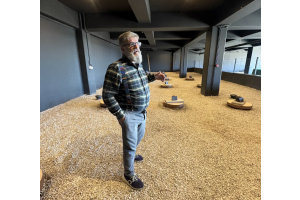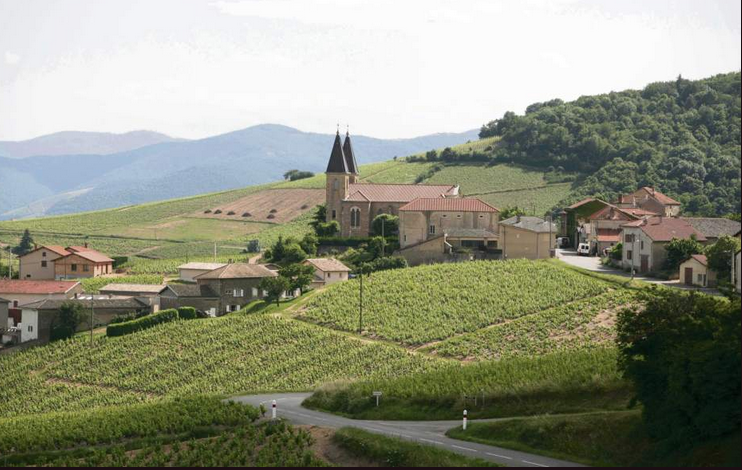
Brumaire, La Dive, RAW in London, New York, and LA -- natural wines and the recent storm of natural wines fairs to celebrate them makes it only, well, natural to wonder what gave rise to this surge of interest in these honest and direct expressions of culture, place, and tradition in a bottle.
There’s really no better place to look for an answer than the Gang of Four, who launched the natural wine revolution in the 1970s. To understand this group’s import, we need to go back to France in the 1950s and ‘60s, a time when the chemical industry, still revved up from wartime production levels, and a country still hungry from a decade of wartime depravation, turned to chemical farming in a big way. It would take vignerons with vision and courage to stand up to what had become the dominant paradigm in vineyards throughout the land.
Legendary importer Kermit Lynch tells the story like this: Jules Chauvet, a winemaker, chemist, and, in Lynch’s memorable words, a “viticultural prophet” who had been espousing the virtues of “the old practices of viticulture and vinification,” took the ear of Marcel Lapierre.
Lapierre was a Beaujolais winemaker who took over his family’s domaine in 1973. With time, he realized the synthetically farmed, interventionist styles of wines even he was making were increasingly at odds with his palate -- and his values. By 1980, he had banded together with three like-minded young winemakers, Guy Breton, Jean-Paul Thévenet, and Jean Foillard, to form what Lynch dubbed the Gang of Four. They dedicated themselves to the then radical proposition of working with old vines, abandoning synthetic herbicides and pesticides, harvesting late, rigorously sorting grapes, adding minimal sulfur dioxide or none at all, and doing away with the common practice of adding sugar to fermenting wine.
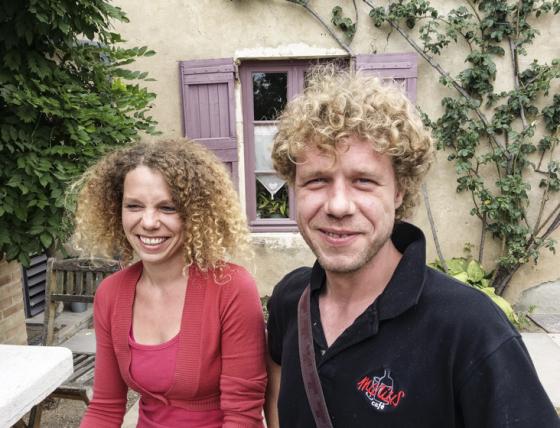
(Photo Camille and Mathieu Lapierre)
The Beaujolais region of France, technically the southernmost extension of Burgundy, proved very well suited to such a revolution. The granitic soils, favorable climate, and amiability of the dominant grape variety, Gamay, allowed for a conversion from chemical farming in a way that, say, the Cote des Nuits, did not. Then came the Beaujolais “Nouveau” marketing campaign of the 1980s, which had nothing to do with the Gang of Four’s approach and left a lasting stain on the region as a source of cheap, simple, not necessarily vin naturel. Only in the past five years or so have American drinkers reconsidered Beaujolais, in particular wines from the region’s ten subzones, or Crus.
The Gang would later expanded to include one more member, Joseph Chamonard, from Morgon. Today this group is legendary for its courage and vision, and countless winemakers around the world have taken up their “old practices” creed. Chauvet passed away in 1989, leaving the Gang to carry on his teachings. In 2010, the death of Lapierre left a gap that his son Mathieu and daughter Camille now fill, taking the next logical step of introducing biodynamic practices at the family winery.
Grape Collective spoke with Camille Lapierre and Jean Foillard, now considered an iconic producer in Morgon, one of Beaujolais’ best crus, to discuss the origins of the groups and the revolution they started, the impact of which is more alive now than ever before.
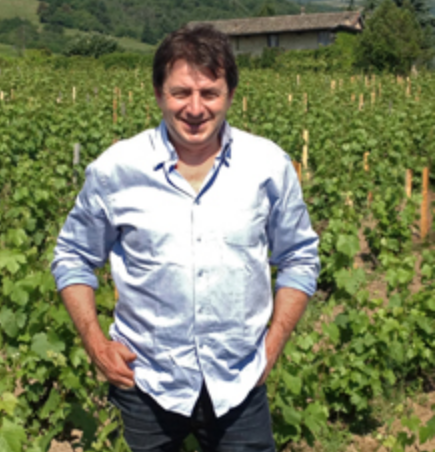
(Photo Jean Foillard)
Grape Collective: Perhaps we can talk about about your families. Jean, please tell us a little bit about your families’ history in wine.
Jean Foillard: My father, grandfather, and great, great grandfather were making wine.
How have the wines changed over time?
Jean Foillard: The wine didn't change in my family, but it did change with Camille’s father... He was one of the first to start making natural wine again in Beaujolais. The first cuvée was in 1978. This led to reworking the vineyards, returning to a clean practice of viticulture. It’s true that Pierre was the one to bring us back into this practice…for me it was in 1985.
At the time, there was an excess of chemicals in viticulture, an excess of herbicides. The modern trend in oenology was advancing enhancing products such as isogeneic yeasts. We wanted to stay away from that. By doing that, we returned to a way of winemaking that our ancestors were doing but with more ease, with organic practices, with more analytical methods, controls of the cold and of the temperature.
And so, it’s not so much looking backwards in time, it’s looking forward in the sense that you’re taking the best practices from the past and adding technology to help you make a better wine.
Jean Foillard: Yes, of course, it’s a mix between both, and [in] the ‘70s … a lot of people used the new products [that] came into the market. But it was the easy way to learn about how to make wine before and the technology ... now in the market, but just to work in a natural way to make wine, to see with the microscope the yeasts, the bacteria [and] work with the cold temperature.
And when you first made the change and made this decision not to use pesticides and to work in a natural way, were there people in the community that gave you problems? Were there people saying what are you doing, how could you do this? Did you have issues like that?
Camille Lapierre: It was not me, because it was more more my father and Jean.
At first, the other vignerons were making fun of us. But very quickly they realized that we were maybe not so wrong. We were able to sell more wine with more ease and sell it more expensive.
I have also to say that, at the time, we were gourmand, we were eating at restaurants, there were good restaurants. However, the wine there was not great…it was made industrially and in bulk, and we didn’t like it. So (Camille’s) father remembered the wines of his grandfather and wanted to start again to make gourmand wines, digestible wines, things that had disappeared in the 80s.
And when you made the change to make wine in a more natural way, did you have convictions at the beginning that this was the right way or were there doubts?
Jean Foillard: At the very beginning, we were not so sure where we were going. We had lost the experience of the elders, but we had the analytical tools and technical too to deal with the cold. We were able do microscopic control. At the beginning we worked together, which helped us to grow. We discovered that we had some missteps, there were cuvées that we messed up. But that’s part of the learning process.
Talk about the Gang of Four, the Gang of Five, as it’s known as. What is that group and how did it become so influential?
Jean Foillard: We don’t know how we were influential… We were party buddies before making wine. Since we were already friends, your (Camille’s) father sensed that we should go in this adventure…as friends. There was no market, so we didn’t know at all where we were going. There were very few clients since nobody knew about this style of winemaking, it had disappeared since the modern wines.
And now your wines are very sought after. They're highly allocated, they are hard to find in shops and restaurants now because the demand is so high. Do you feel you've been justified in the actions you took all those years ago, all the risk you took in changing the way you made wine?
Jean Foillard: At the time we never asked ourselves those kinds of questions. But we did realize that we were drinking again because of our style of winemaking.
We also convinced a lot people who didn’t drink Beaujolais anymore to drink it again.
We can say that all the people who were drinking again these…natural wines if we want to call them that way if it’s easier…and who used to like wines industrial wines; none of them came back saying I’m not going to drink these natural wines, I want the industrial wines. Not one person.
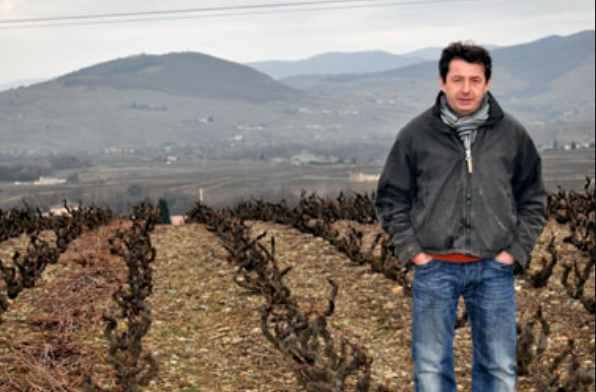 Let's talk about natural wine, it’s a term that seems not to have a very clear definition and different people talk about it in different ways. What does natural wine mean to you?
Let's talk about natural wine, it’s a term that seems not to have a very clear definition and different people talk about it in different ways. What does natural wine mean to you?
Camille Lapierre: For me, there is no real definition of natural wine. For me, it’s to make wine in as natural a way as possible. So it doesn't mean you do nothing in your cellar or your tank, it means if you have to use something you will, if you don't need to, you will not. You know what is good and what is bad for your wine and there is no religious extremism. I think in natural wine there is no definition, though people use it a lot so I am sure customers are very lost about that and I understand that. I will ask Jean his definition but for me there is no natural definition, just to make wine as natural as possible and still wine and not make something that is not wine that we can call a bottle of wine when the proportion of volatile in everything is legal and if you’re more... there is another word for that... we can call it vinegar if its more volatile... there is a lot of words for for different things but wine is wine and I will ask Jean for his definition.
Jean Foillard: It’s not easy…we have to go back to what we have been talking about: it’s to keep chemicals away from viticulture, herbicides out of the soil, the chemicals for various plant disease. As for the vinification…using indigenous yeast. A vinification that we follow closely but that is made on its own. We’re not systematically adjusting the yeast levels, adding a bunch of products from modern oenology that I barely know, or applying practices like thermovinification.
You haven't used sulfur in the past, but there isn't a philosophical opposition to using sulfur?
Jean Foillard: Ideally, making wine completely without sulfur would be perfection. But it turns out that wine is living matter that can have microbes develop. Especially if we don’t have perfect control of temperature along the production process. So we can use sulfur. The important thing is the dosage of the sulfur…to not put unnecessary amounts. Today we know that we can forgo sulfur during the vinification. But now that wine travels, we know that bacteria can grow at very low levels of temperature and we don’t have any other methods than put a bit of sulfur. We also have very sterile filtering methods, but I think that we damage the wine a lot less by minimal addition of sulfur than with very fine filtration.
There have been some winemakers who have been critical of natural wines. We did an interview with Michel Chapoutier and his attitude is that there is too much bottle variations in natural wines.... some are good and some are bad; he is very anti-natural wine. What do you say to a critic like that, who is saying you’re not making consistently good wines?
Jean Foillard: I don’t understand why Michel Chapoutier criticizes these wines. Today it’s unimaginable for us to encourage to add chemicals in nature and to add even more in the bottles. The trend nowadays is to go through cleaner products, to stop poisoning ourselves. As for the stability of the wines, there are tens of thousands of natural wines that manage to be stable. Do they have a problem with our wines? I don’t think so.
There are some cases in France of people trying to do natural wine, but not very seriously. But you can’t compare these winemakers to the many natural wineries around the world in the US, in Argentina, in Italy, in Spain too… everywhere. Natural winemaking is really growing and you can’t use these few bad winemakers to put down all these established wineries. In conventional wines there are the same issues, there are some really bad wines.
Do you have favorite wines or favorite wine regions other than your own that you enjoy drinking?
Camille Lapierre: Hmm. This is a difficult question. No, I don't have... I don't know a lot about New World wine. I try to taste a lot of European wine. I love a lot of wine of Italy, Spain, too, in France and all the area. I love the wine and I think it depend on the moment, with who you are, to appreciate more or less a wine.
Jean Foillard: When the wine is good, it’s good and when it’s drinkable and there is not too much product and you can wake up clear and good. We [would] say when it’s very digestible.
Fantastic. Is there anything I haven't asked you think we should touch on?
Jean Foillard: We will continue to make wine like this and we will not go back to the old way. I don't want to do it any other way [either]. We will continue to avoid polluting on this planet. So we will continue to make wine like that.
Have you seen, since you became very popular, a lot of your fellow winemakers in your region following your lead and making wine in a similar way?
Jean Foillard: I think so. It’s everywhere now. Even regions that were having difficulties like Touraine are now making a lot of natural wine. It’s also in easy regions, where they have easy wines that are expensive and now have to do even less of an effort.
